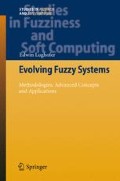Abstract
This chapter deals with several issues for guiding evolving fuzzy systems to more robustness during the incremental learning process in order to assure models with high prediction and classification performance. Hereby, we basically see two aspects of defining a robust behavior during on-line modelling:
-
1
Doing incremental and evolving learning in a way, such that the performance of the evolved models are close to the (hypothetical) batch solution (achieved by collecting all the data and loading them at once into the training algorithms). From mathematical point of view, this means that a kind of convergence of some parameters to an optimality criterion is achieved.
-
2
Implementing approaches to assure a high performance of the models with respect to accuracy, correctness and stability also in specific cases occurring in the incoming data streams or in the learning procedure itself. The former can be caused by specific situations in the environmental system (e.g. a changing or faulty system behavior) where the data is generated.
Themeaning and problematic nature of the former pointwas already defined and described in more detail in Section 1.2.2.2 (Chapter 1) and dealt with in some parts of Chapter 3 when describing several evolving fuzzy systems approaches. The second point will be handled in detail in this chapter. Therefore, we examine the following problems:
-
Instabilities in the learning process (Section 4.1)
-
Upcoming drifts and shifts in on-line data streams (Section 4.2)
-
Situations causing an unlearning effect (Section 4.3)
-
Outliers and faults in on-line data streams (Section 4.4)
-
Uncertainties in the models due to high noise levels or lack of data (Section 4.5)
-
Extrapolation situations for new samples to be predicted (Section 4.6)
and present solutions to each of these. All these approaches implicitly contain a kind of generic spirit which means they are not specifically dedicated to and linked with one evolving fuzzy system approach, but can be applied to most or at least a group of approaches demonstrated in Chapter 3. These issues finally serve as bases for ensuring process-save implementations and run-throughs of EFS with a high predictive quality in industrial systems.
Access this chapter
Tax calculation will be finalised at checkout
Purchases are for personal use only
Preview
Unable to display preview. Download preview PDF.
Rights and permissions
Copyright information
© 2011 Springer-Verlag Berlin Heidelberg
About this chapter
Cite this chapter
Lughofer, E. (2011). Towards Robust and Process-Save EFS. In: Evolving Fuzzy Systems – Methodologies, Advanced Concepts and Applications. Studies in Fuzziness and Soft Computing, vol 266. Springer, Berlin, Heidelberg. https://doi.org/10.1007/978-3-642-18087-3_4
Download citation
DOI: https://doi.org/10.1007/978-3-642-18087-3_4
Publisher Name: Springer, Berlin, Heidelberg
Print ISBN: 978-3-642-18086-6
Online ISBN: 978-3-642-18087-3
eBook Packages: EngineeringEngineering (R0)

